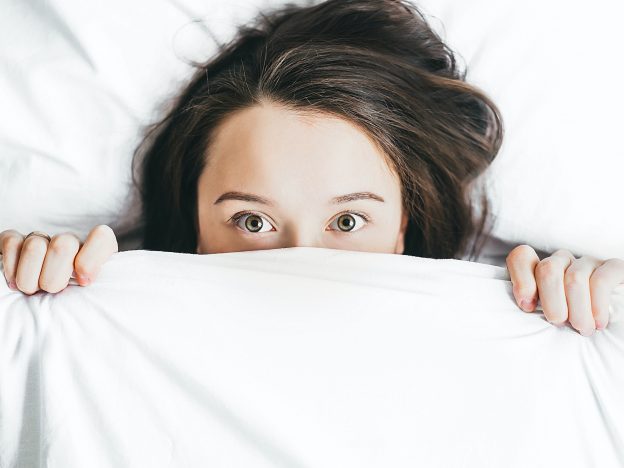Getting your teen or nearly teenage child out of bed in the morning can feel like an impossible dream but it is possible - it might take a little time to work out but you will get there.
Sleep is vital to well-being, so if there's one thing you need to safeguard, it's your teenager's sleep. Just experiencing all the changes of puberty is exhausting. Teenagers are going through physical, emotional AND hormonal changes - all at the same time. Being a teenager is HARD and sleep is where they process all this activity. Add the increased pressure around their education, the expectations that they need to work out what they’re going to do and who they’re going to be as they grow up leaves them with a LOT to cope with.
Do talk to them to see if there are any issues or worries you might not be aware of. Let them know that you can discuss and resolve these issues together.
Hormones and body clocks
Did you know that  most brain functions are not fully formed until we are at least 25 years old? This means that your teenager is working with a brain that is still under construction. This reorganisation or rewiring of our brains happens during sleep, so given all that is going on in puberty, it makes sense that teenagers need 10-12 hours of sleep each night.
most brain functions are not fully formed until we are at least 25 years old? This means that your teenager is working with a brain that is still under construction. This reorganisation or rewiring of our brains happens during sleep, so given all that is going on in puberty, it makes sense that teenagers need 10-12 hours of sleep each night.
This rewiring also means that your teenager's body clock runs slower than adults, making the day seem longer. They also start staying up later as they get older, making that 10+ hours of sleep each night even harder to find.
There’s been some discussion that students would function better if the school day started later and some middle and high schools in the US have implemented later start times for students. This hasn't happened here in the UK yet, so teens and tweens still need to get up and get to school on time!
Children aren’t born with the self-regulation skills that adults use to help plan, focus attention, remember instructions and multi-task. You can help by showing them how to establish their routines and by role-modelling having a routine yourself.
Social media
Social media is everywhere and your teenager has access to and access from it, 24/7. Don’t assume they aren’t on their phones at night!
Artificial or ‘blue’ light, which is given out by phones and other electronic devices, can disrupt sleep patterns in all of us. When natural light dims, melatonin (the sleep hormone) is produced in our bodies, which tells us it’s time for sleep. When this is disrupted by artificial light, our bodies are tricked into staying awake.
How to make mornings easier

- Try to encourage them to stick to a routine even on weekends and holidays. Lie-ins and late nights just disrupt the body clock further.
- Encourage them to get their clothes and what they need to take with them to school or college ready the night before.
- Get them outside in the daylight. Exposure to natural light affects when our bodies get tired and ready to sleep naturally.
- Avoid morning lectures. There's no point in telling them off in the morning when they’re just waking up, it's already happened, it won't make them get up faster and it will just antagonise them (and you!). Remember that they can’t help being tired at that point.
- Let them stretch their problem-solving skills – let them take responsibility for getting themselves up. Let them set their own sleep schedule around school.
Allow the natural consequences of sleeping in
Young people need to learn how to get themselves where they need to be, at the right time. Making the switch of seeing this as their responsibility and not yours can be difficult for parents to do. Remember that a fundamental part of our job as parents and carers is to help our kids grow to become responsible, happy, fully functioning adults. If they’re constantly late because they struggle to get out of bed, they need to learn how to fix this and to make healthy choices for themselves.
Let them know that you trust them to work these things out for themselves. Get out of thinking that it's your responsibility to get them up in time and change to “I know you know this”.
Here are some practical tips you can use to help your teenager get up in the mornings:
- Get an old-school alarm clock, and put it just out of reach.
- Open their bedroom door and let the household sounds and smells of the morning in. Let the pets in their room, let their younger siblings go in. There's no need to tiptoe about in the morning. There is also no need to make extra noise like banging a spoon on a saucepan (no matter how tempted you might be!).
- Open the curtains – sunlight reduces melatonin (the sleep hormone) which helps us feel more alert and to wake up in the morning.
- Take them in a glass of water – it’s a good start to anyone’s day and teens need to drink more water!
- Be a positive sleep role model for your child. Have a good night-time routine yourself. Take time to wind down before bed, reduce screen-time before (and in) bed, relax and manage your stress, and reduce your intake of stimulants, such as caffeine before bedtime.
Counselling for parents can help you with this
Being a parent to a teen or nearly teenage child is hard! Speaking to a counsellor about family issues such as this can help to improve communication and make relationships stronger both in and out of the family.
Are you ready to make this positive change with therapy? Get in touch here to see how I can help. I'm based in Peacehaven, East Sussex and work online.


